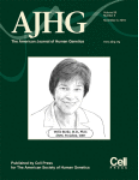 The expressivity of Mendelian diseases can be influenced by factors independent from the pathogenic mutation: in Duchenne muscular dystrophy (DMD), for instance, age at loss of ambulation (LoA) varies between individuals whose DMD mutations all abolish dystrophin expression. This suggests the existence of trans-acting variants in modifier genes. Common single nucleotide polymorphisms (SNPs) in candidate genes have been established as DMD modifiers. Here, the authors performed a genome-wide association study of age at LoA in a sub-cohort of European or European American ancestry (n = 109) from the Cooperative International Research Group Duchenne Natural History Study (CINRG-DNHS). They focused on protein-altering variants (Exome Chip) and included glucocorticoid treatment as a covariate. As expected, due to the small population size, no SNPs displayed an exome-wide significant p value (< 1.8 × 10-6). Subsequently, they prioritized 438 SNPs in the vicinities of 384 genes implicated in DMD-related pathways, i.e., the nuclear-factor-κB and TGFβ pathways. The minor allele at rs1883832, in the 5′-untranslated region of CD40, was associated with earlier LoA (p = 3.5 × 10-5). This allele diminishes the expression of CD40, a co-stimulatory molecule for T cell polarization. The authors validated this association in multiple independent DMD cohorts (United Dystrophinopathy Project, Bio-NMD, and Padova, total n = 660), establishing this locus as a DMD modifier. This finding points to cell-mediated immunity as a relevant pathogenetic mechanism and potential therapeutic target in DMD.
The expressivity of Mendelian diseases can be influenced by factors independent from the pathogenic mutation: in Duchenne muscular dystrophy (DMD), for instance, age at loss of ambulation (LoA) varies between individuals whose DMD mutations all abolish dystrophin expression. This suggests the existence of trans-acting variants in modifier genes. Common single nucleotide polymorphisms (SNPs) in candidate genes have been established as DMD modifiers. Here, the authors performed a genome-wide association study of age at LoA in a sub-cohort of European or European American ancestry (n = 109) from the Cooperative International Research Group Duchenne Natural History Study (CINRG-DNHS). They focused on protein-altering variants (Exome Chip) and included glucocorticoid treatment as a covariate. As expected, due to the small population size, no SNPs displayed an exome-wide significant p value (< 1.8 × 10-6). Subsequently, they prioritized 438 SNPs in the vicinities of 384 genes implicated in DMD-related pathways, i.e., the nuclear-factor-κB and TGFβ pathways. The minor allele at rs1883832, in the 5′-untranslated region of CD40, was associated with earlier LoA (p = 3.5 × 10-5). This allele diminishes the expression of CD40, a co-stimulatory molecule for T cell polarization. The authors validated this association in multiple independent DMD cohorts (United Dystrophinopathy Project, Bio-NMD, and Padova, total n = 660), establishing this locus as a DMD modifier. This finding points to cell-mediated immunity as a relevant pathogenetic mechanism and potential therapeutic target in DMD.
